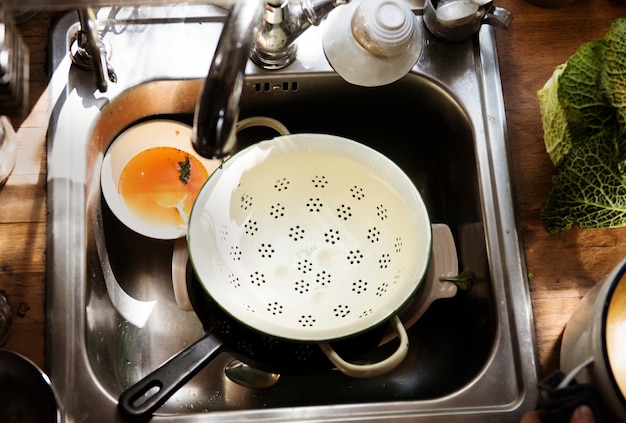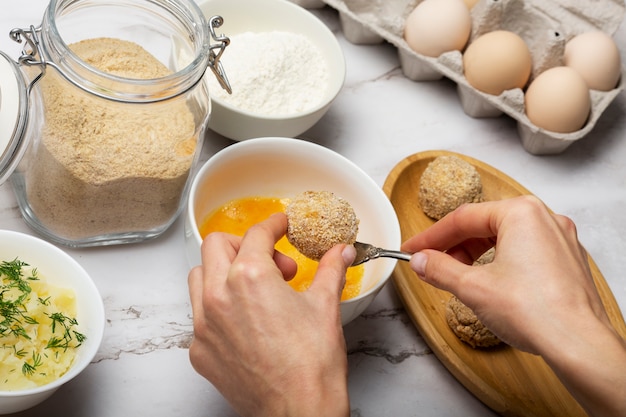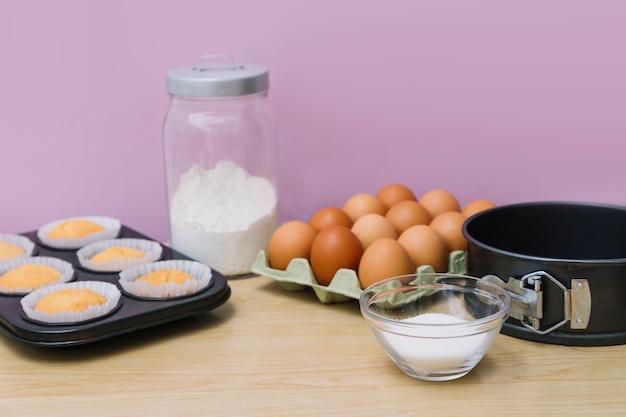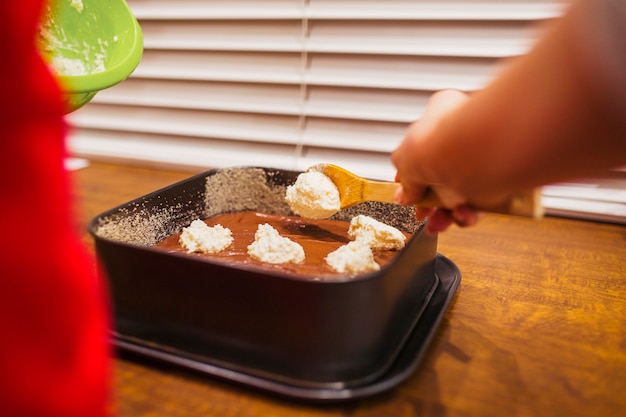I've always loved the simplicity and versatility of a perfectly cooked hard-boiled egg. You know, the kind where the yolk is a vibrant orange, with a smooth, creamy texture, and the white is just firm enough to slice without crumbling. It's a simple pleasure, but one that can be surprisingly tricky to master. Overcook it a bit, and you end up with a rubbery yolk. Undercook it, and you're left with a runny, gooey mess.
I've tried countless methods and recipes over the years, experimenting with different cooking times, water temperatures, and even adding vinegar to the pot. But it wasn't until I started to delve deeper into the science behind the perfect hard-boiled egg that I really started to understand what makes a good one. And let me tell you, there's a lot more to it than just dropping an egg in boiling water and setting a timer!
(Part 1) Understanding the Science Behind the Perfect Hard-Boiled Egg

The key to achieving that perfect hard-boiled egg is understanding how heat affects the proteins in the egg.
The Amazing Transformation of Egg Proteins
When you heat an egg, the proteins in both the yolk and the white start to denature. Think of it as the proteins unwinding and rearranging themselves. This process is what gives the egg its cooked texture. It's like a mini-molecular transformation happening right before your eyes.
- The White: The proteins in the egg white are more sensitive to heat, starting to denature at a lower temperature than those in the yolk. As the egg cooks, these proteins coagulate and form a solid mass. The longer you cook the egg, the firmer the white becomes. It's like the white is slowly turning into a solid structure.
- The Yolk: The yolk's proteins are a bit tougher to crack. They start to solidify as the egg cooks, but not as quickly as the white proteins. The yolk's texture also changes as it cooks, becoming more viscous and eventually firm. It's like the yolk is slowly transitioning from a liquid to a thick, creamy paste.
Temperature Control: The Secret Weapon for Perfect Texture
The key to a perfectly cooked hard-boiled egg is not just about cooking time, but also about temperature control. You want to ensure that the egg is heated evenly and gradually so that the proteins in the white don't solidify too quickly, creating a tough, rubbery texture, while the yolk stays creamy and vibrant.
This is where a lot of traditional methods fall short. Just dropping an egg into boiling water can cause the egg white to cook too quickly, making it rubbery, while the yolk might not cook through properly. It's like giving the egg a shock, rather than a gentle, gradual warm-up.
(Part 2) The Best Method for Perfect hard-boiled eggs: The gradual heating method

After years of experimentation, I've found the gradual heating method to be the most reliable and consistent way to achieve the perfect hard-boiled egg. It involves slowly raising the temperature of the eggs in cold water, ensuring that they cook evenly throughout. It's like taking the egg on a gentle journey to perfect doneness.
The Gradual Heating Method: Step-by-Step
Here's how I do it:
- Gather your ingredients: You'll need fresh eggs, a large saucepan, a slotted spoon, and a timer. These are the essential tools of the trade.
- Place the eggs in the saucepan: Gently place the eggs into the saucepan and add cold water until the eggs are completely covered by at least an inch of water. This ensures that the eggs are fully submerged and cook evenly.
- Bring the water to a simmer: Slowly bring the water to a simmer over medium heat. Don't let the water come to a boil. A simmer is characterized by tiny bubbles rising to the surface. It should take about 5-7 minutes for the water to reach a simmer. This slow and steady approach is key to gradual heating.
- Reduce heat and cook: Once the water is simmering, reduce the heat to low, cover the saucepan, and set the timer for 10-12 minutes. This is the cooking time for a medium-cooked yolk. If you want a firmer yolk, cook for 14-16 minutes. This is where you can tailor the cooking time to your desired level of doneness.
- Transfer to an ice bath: When the timer goes off, carefully transfer the eggs to a bowl filled with ice water. This stops the cooking process and prevents the yolk from becoming overly firm. It's like giving the eggs a refreshing shock treatment to stop them from cooking any further.
- Peel and enjoy! After about 5-10 minutes in the ice bath, carefully peel the eggs. The ice bath also makes peeling much easier, as it helps to loosen the shell.
(Part 3) Variations for Different Preferences

The beauty of this method is that you can easily adjust the cooking time to achieve the perfect level of doneness for your taste. It's like having a customized egg experience.
Cooking Times for Different Levels of Doneness
| Desired Level of Doneness | Cooking Time (minutes) |
|---|---|
| Very Soft Yolk | 6-8 |
| Soft Yolk | 9-10 |
| Medium Yolk | 11-12 |
| Firm Yolk | 13-14 |
| Hard Yolk | 15-16 |
(Part 4) Essential Tips for perfect hard-boiled eggs
Here are some additional tips that I've picked up over the years to ensure that your hard-boiled eggs turn out perfectly every time. These are the little details that can make a big difference.
Use Fresh Eggs
Fresher eggs are easier to peel because the membrane between the egg white and the shell is less tightly bound to the shell. Older eggs often have a more distinct and stubborn membrane. It's like the membrane gets stickier as the egg gets older.
Start With Cold Water
Always start with cold water. This allows the egg to heat up gradually, preventing the white from setting too quickly and becoming rubbery. It's like giving the egg a gentle and controlled warm-up.
Don't Overcook
It's better to undercook an egg than overcook it. You can always cook it a little longer if it's not quite firm enough. But once you've overcooked it, there's no going back. Overcooked eggs can be a bit rubbery and less appealing.
Add a Pinch of Salt to the Water
Adding a pinch of salt to the water helps prevent the eggs from cracking. The salt helps to raise the boiling point of the water, making it slightly less likely to boil over. It's like giving the eggs a little extra protection.
Don't Peel the Eggs While They're Hot
Wait until the eggs have cooled completely before peeling. This makes the peeling process much easier, and less likely to cause the egg to break. Hot eggs are more fragile, so it's best to let them cool down before attempting to peel.
(Part 5) The Importance of Peeling
Peeling a hard-boiled egg can be a frustrating experience, especially if you're not using the right technique. Here's how I do it, and I've found that it works like a charm:
Tips for Easy Peeling
- Crack the Egg: Carefully crack the egg all over by tapping it gently on a hard surface. This weakens the shell and makes peeling much easier. It's like creating a network of cracks to help the shell come off.
- Roll the Egg: Once cracked, roll the egg between your hands to help loosen the shell. This gentle rolling action helps to further separate the shell from the egg.
- Start at the Wide End: Begin peeling the egg at the wide end, where the air pocket is located. The shell should come off easily in this area. This is the point where the shell is naturally thinner.
- Use a Spoon: If the shell is stubborn, use a spoon to gently pry it off. A spoon provides a gentle and controlled way to remove stubborn shell fragments.
- Run the Egg Under Cold Water: If the shell is sticking, run the egg under cold water for a few seconds. This helps to loosen the shell and makes peeling much easier. Cold water helps to contract the shell and loosen its grip on the egg.
(Part 6) Troubleshooting Common Hard-Boiled Egg Problems
Even with the best techniques, sometimes things don't go according to plan. Here are some common problems and how to troubleshoot them:
Problem: The Yolk is Green
Cause: This is a chemical reaction that happens when the egg is cooked for too long at too high a temperature. The iron in the yolk reacts with the sulfur in the egg white, creating a green ring around the yolk. It's a bit of a chemical mishap that happens during the cooking process.
Solution: Cook the eggs for a shorter period of time, or use the gradual heating method to ensure that the eggs cook evenly. This prevents the yolk from getting overcooked and helps to avoid the green ring.
Problem: The Egg White is Rubbery
Cause: This usually happens when the egg white is overcooked. The proteins in the white solidify too quickly, creating a tough, rubbery texture. It's like the egg white has become too firm.
Solution: Use the gradual heating method to ensure that the egg white cooks evenly, or shorten the cooking time. This ensures that the white cooks gently and avoids becoming rubbery.
Problem: The Egg Cracks in the Water
Cause: This can happen for several reasons: the eggs are too old, the temperature change is too drastic, or they are being jostled around in the water. It's like the eggs are too delicate and can't handle the rough treatment.
Solution: Use fresh eggs, add a pinch of salt to the water to prevent cracking, and be gentle when placing the eggs in the saucepan. These simple precautions can help to keep the eggs intact.
(Part 7) Beyond the Basics: Hard-boiled egg variations
Once you've mastered the basics of cooking the perfect hard-boiled egg, you can start to experiment with different variations. It's time to get creative with your eggs!
Flavored Hard-Boiled Eggs
You can add flavour to your hard-boiled eggs by adding herbs, spices, or other ingredients to the cooking water. Some popular options include:
- Dill: Add a few sprigs of dill to the cooking water for a delicate and refreshing flavour. Dill adds a touch of herbal freshness to the eggs.
- Garlic: Add a clove of garlic to the cooking water for a savory and pungent flavour. Garlic gives the eggs a rich and savory aroma.
- Curry Powder: Add a teaspoon of curry powder to the cooking water for a spicy and aromatic flavour. Curry powder adds a vibrant and spicy kick to the eggs.
deviled eggs
Deviled eggs are a classic appetizer or snack. They're made by chopping hard-boiled eggs, mixing the yolk with mayonnaise, mustard, and other seasonings, and then filling the egg white shells. You can find countless variations of deviled eggs, each with its own unique flavour profile. Deviled eggs are a fun and versatile appetizer that can be customized to your liking.
egg salad
Egg salad is a simple and delicious sandwich filling. It's made by chopping hard-boiled eggs, mixing them with mayonnaise, mustard, and other ingredients, and then spreading it on bread. It's a classic and satisfying sandwich filling that can be enjoyed on its own or as part of a larger meal.
(Part 8) The Importance of a Good Egg
I've found that the quality of the egg really matters when it comes to making a delicious hard-boiled egg. Here's what I look for when choosing eggs:
choosing the right eggs
- Freshness: Look for eggs that are as fresh as possible. You can check the date on the carton, but I usually just go for the freshest eggs I can find. Fresher eggs have a better taste and texture.
- Free-Range: I prefer to buy free-range eggs, as I feel they have a better flavour and texture than cage-raised eggs. free-range eggs are often considered to be more flavorful and have a richer yolk.
- Size: I generally prefer medium-sized eggs for hard-boiling, as they cook evenly and have a good yolk-to-white ratio. Medium-sized eggs offer a good balance of yolk and white, making for a satisfying hard-boiled egg.
(Part 9) FAQs
1. Can I use a pressure cooker to cook hard-boiled eggs?
Yes, you can use a pressure cooker to cook hard-boiled eggs. This method is quicker than traditional methods. However, be sure to use a trivet or other device to prevent the eggs from touching the bottom of the pot, as this can cause cracking. Pressure cooking can be a time-saving option, but it's important to be careful to avoid cracking the eggs.
2. How long can I store hard-boiled eggs?
Hard-boiled eggs can be stored in the refrigerator for up to one week. It's best to store them in a container with a lid to prevent them from drying out. Proper storage helps to keep the eggs fresh and flavorful.
3. Why are some hard-boiled eggs difficult to peel?
As mentioned previously, older eggs are more difficult to peel. This is because the membrane between the egg white and the shell is more tightly bound to the shell. You can also try adding a tablespoon of baking soda to the water when you cook the eggs. This can help to loosen the shell. The membrane becomes more stubborn as the egg ages, making peeling a bit more challenging.
4. Can I use brown eggs instead of white eggs for hard-boiling?
Yes, you can use brown eggs or white eggs for hard-boiling. The color of the eggshell doesn't affect the taste or texture of the cooked egg. It's all about personal preference when it comes to egg color.
5. What are some creative ways to use hard-boiled eggs?
Beyond the classics like egg salad and deviled eggs, there are endless creative possibilities for using hard-boiled eggs in your cooking. Here are a few ideas:
- Egg Salad Sandwiches: Get creative with your egg salad sandwiches by adding different ingredients like chopped celery, red onion, or pickles. These additions add flavor and texture to your egg salad sandwiches.
- Egg Salad Wraps: Swap the bread for tortillas and fill them with egg salad for a lighter option. Tortillas offer a fresh and convenient alternative to bread.
- Egg Salad Bowls: Combine egg salad with leafy greens, avocado, tomatoes, and other vegetables for a nutritious and flavorful bowl. Egg salad bowls are a healthy and satisfying meal option.
- Egg Salad Stuffed Potatoes: Bake potatoes and fill them with egg salad for a hearty and satisfying meal. Egg salad stuffed potatoes are a comforting and filling meal.
- Egg Salad Pasta Salad: Add hard-boiled eggs to a pasta salad for extra protein and texture. Eggs add a protein boost and a satisfying texture to pasta salad.
- Egg Salad Crostini: Top toasted crostini with egg salad for a simple and elegant appetizer. Egg salad crostini is a delicious and easy-to-make appetizer.
Everyone is watching

How to Cook Frozen Lobster Tails Perfectly: A Step-by-Step Guide
RecipesLobster. Just the word conjures up images of lavish meals, special occasions, and a taste of luxury. But let's...

Pork Fillet Cooking Time: How Long to Cook It Perfectly
RecipesPork fillet, or tenderloin as it's sometimes called, is a real favourite in our house. It's so versatile, and...

Pigs in a Blanket Cooking Time: How Long to Bake for Perfect Results
RecipesAh, pigs in a blanket. Just the name conjures up images of those delightful little parcels of crispy pastry en...

The Ultimate Guide to Cooking Delicious Frankfurters
RecipesLet's face it, we all love a good frankfurter. It's a classic, simple, and always satisfying. But let's be rea...

Wolf Meat Recipes: A Guide to Cooking Wild Game
RecipesLet's be honest, you don't see wolf meat at your local butcher shop every day. It's a bit of a wild card, but ...
